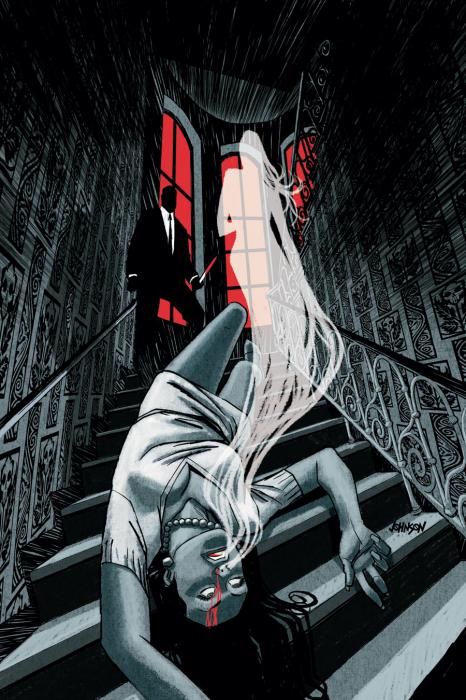"Ghosts" #1 is Vertigo's Halloween anthology, and there's a wide variety of stories, with most of them cute, funny or weird as opposed to thrilling or chilling.
"The Night After I Took The Data Entry Job I Was Visited by My Own Ghost" by Al Ewing and Rufus Dayglo is an upbeat, colorful piece with a self-explanatory title. The ghost isn't a source of fear; instead, he's a physical manifestation of paths not taken. The humor has a nice specificity, but overall the story is a one-note joke.
"Run Ragged" by Toby Litt, Mark Buckingham and Victor Santos is a "Dead Boys Detectives" adventure, reviving Neil Gaiman's characters from "Sandman" and "The Children's Crusade." Buckingham was one of the original artists for these characters, Litt gets the tone right and the short sub-comic "Twinkle's Tale" is cute. Unfortunately, it's not a full story and this fragment ends right after the boys get some work and run into some trouble. It is intensely frustrating, even more so because the ending note says, "to be continued in the next Vertigo Anthology," which could be months away.
"Wallflower" by Cecil Castellucci and Amy Reeder is a story about slow loss and relationship bonds. Ghosts are metaphorical in this story, and it ends with a strange, inexplicable twist. Reeder's art is attractive and bright as usual, and she has a good eye for fashions and interiors of different decades.
"The Boy and The Old Man" by Joe Kubert is a story about family and the supernatural. It lacks dialogue, but the pictures bring to life the text. I appreciate that the editors chose to publish Kubert's raw pencils, and the reader can appreciate his linework and composition. More than any other story in the anthology, "The Boy and the Old Man" explores the supernatural thoughtfully, about how ghosts are about the inability of the dead to let go of the living, and vice versa. However, the story ends abruptly, on a minor but ghastly note.
"A Bowl of Red" by Neil Kleid and John McCrea is the goriest story of the nine. It's a story that mixes food with hedonism and heathen religions, with unlikable characters who are shocked to find what they ought to have expected.
"Bride" by Mary H. K. Choi and Phil Jimenez is a strange, psychosexual, difficult-to-follow story about a character who can't let go of the dead, and there are themes of addiction and cannibalistic grief, as well as truly strange family dynamics and visuals.
"Treasure Lost" by Paul Pope and David Lapham is a "space pirates" science fiction epic, and it suffers greatly because the it's difficult to write this large a story within eight pages. It would be also be a massive stretch to call it a ghost story. The narrative feels compressed and a lot of the world-building happens through the main character's explanatory voiceover.
"The Dark Lady" by Gilbert Hernandez has a familiar plot twist, but there's also an element of mystery in the characters' relationships. Like most of his work, Hernandez' dialogue is natural-sounding and his black and white artwork has an excellent variety of line.
"Ghost for Hire" by Geoff Johns and Jeff Lemire has fluid dialogue and endearing characters. The mood of the story is light and refreshing, but it leads to a resolution with a predictable that feels a little too pat, like a well-worn moral fable. However, the ending is whimsical and unexpected, and the two main characters have a good buddy dynamic.
Overall, none of the nine stories in "Ghosts" #1 are enjoyably frightening or particularly memorable. The $7.99 cover price is a lot to pay, especially since "Ghosts" #1 isn't perfect-bound. Fans of particular creators or completists will enjoy some of these tidbits, but it's a mediocre anthology.

